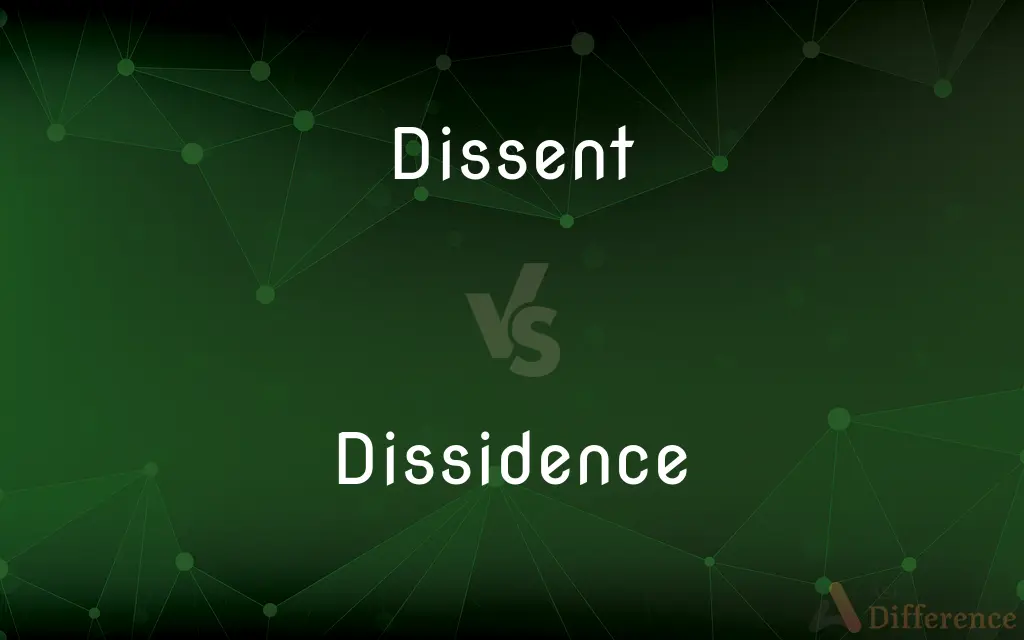Dissent vs. Dissidence — What's the Difference?

Difference Between Dissent and Dissidence
ADVERTISEMENT
Compare with Definitions
Dissent
Dissent is an opinion, philosophy or sentiment of non-agreement or opposition to a prevailing idea or policy enforced by a government, political party or other entity or individual in a capacity of contextual authority. A dissenting person may be referred to as a dissenter.
Dissidence
Protest against official policy
The dissidence of the intellectuals
Dissent
The holding or expression of opinions at variance with those commonly or officially held
There was no dissent from this view
Dissidence
Disagreement, as of opinion or belief; dissent.
Dissent
Hold or express opinions that are at variance with those commonly or officially held
Two members dissented from the majority
ADVERTISEMENT
Dissidence
The state of being dissident; dissent
Dissent
To have or express an opinion different from a prevailing or official position; disagree.
Dissidence
Disagreement; dissent; separation from the established religion.
It is the dissidence of dissent.
Dissent
(Law) To reach a conclusion contrary to the majority of the judges deciding a case; render a minority opinion.
Dissidence
Disagreement; especially disagreement with the government
Dissent
Difference of opinion or feeling; disagreement.
Dissent
The refusal to conform to the authority or doctrine of an established church; nonconformity.
Dissent
(Law) A judicial opinion reaching a conclusion contrary to that reached by the majority of judges deciding a case; a minority opinion. Also called dissenting opinion.
Dissent
(intransitive) To disagree; to withhold assent. Construed with from (or, formerly, to).
Dissent
(intransitive) To differ from, especially in opinion, beliefs, etc.
Dissent
(obsolete) To be different; to have contrary characteristics.
Dissent
Disagreement with the ideas, doctrines, decrees, etc. of a political party, government or religion.
Dissent
An act of disagreeing with, or deviating from, the views and opinions of those holding authority.
Dissent
(Anglo-American common law) A separate opinion filed in a case by judges who disagree with the outcome of the majority of the court in that case
Dissent
(sports) A violation that arises when disagreement with an official call is expressed in an inappropriate manner such as foul language, rude gestures, or failure to comply.
Dissent
To differ in opinion; to be of unlike or contrary sentiment; to disagree; - followed by from.
The bill passed . . . without a dissenting voice.
Opinions in which multitudes of men dissent from us.
Dissent
To differ from an established church in regard to doctrines, rites, or government.
Dissent
To differ; to be of a contrary nature.
Dissent
The act of dissenting; difference of opinion; refusal to adopt something proposed; nonagreement, nonconcurrence, or disagreement.
The dissent of no small number [of peers] is frequently recorded.
Dissent
Separation from an established church, especially that of England; nonconformity.
It is the dissidence of dissent and the protestantism of the Protestant religion.
Dissent
Contrariety of nature; diversity in quality.
The dissent of the metals.
Dissent
(law) the difference of one judge's opinion from that of the majority;
He expressed his dissent in a contrary opinion
Dissent
A difference of opinion
Dissent
The act of protesting; a public (often organized) manifestation of dissent
Dissent
Withhold assent;
Several Republicans dissented
Dissent
Express opposition through action or words;
Dissent to the laws of the country
Dissent
Be of different opinions;
I beg to differ!
She disagrees with her husband on many questions
Share Your Discovery

Previous Comparison
Direct vs. Upfront
Next Comparison
Introductory vs. Introductive














































